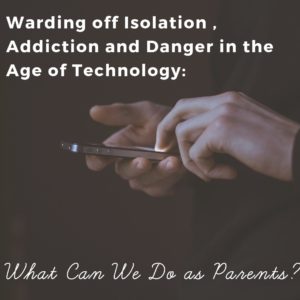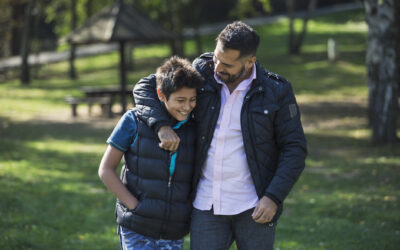 Our children are facing a unique experience of childhood in the age of technology and fast data. The advancements in technology and the proliferation and reach of social media has not only added new dimensions, gifts as well as dangers, but they are also changing the tapestry of relationships and what it means to form relationships thereby impacting our children’s social emotional development. As if caring for a little person and raising them to be the best human being they can be isn’t challenging enough in its own right, doing so in a world in which it seems everyone is “plugged- in” is ever more challenging for a number of reasons.
Our children are facing a unique experience of childhood in the age of technology and fast data. The advancements in technology and the proliferation and reach of social media has not only added new dimensions, gifts as well as dangers, but they are also changing the tapestry of relationships and what it means to form relationships thereby impacting our children’s social emotional development. As if caring for a little person and raising them to be the best human being they can be isn’t challenging enough in its own right, doing so in a world in which it seems everyone is “plugged- in” is ever more challenging for a number of reasons.
Have you traveled on the subway, train or bus lately? You’d be hard pressed not to find someone with their head slanted downward eyes glued to a screen. And forget about those driving in their cars – we can spot within seconds a driver who is holding their phone in their hand (another topic for a completely different blog all together). We see babies and toddlers holding Ipads and smartphones being strolled along. And pass by a group of teens and all are doing pretty much the same – ogling over something on a device and maybe showing their screens to one another. Technology and the devices we use have seemingly become our fifth appendage that’s becoming increasingly hard to leave behind or even put down for a bit.
There’s no argument that technology has expanded our awareness of other worlds and there are numerous benefits from the advancement in our computing ability and the tools we use for communication over the past 30 years. New opportunities for connecting with people across continents in real time, bridging worlds previously oblivious to one another, expanding access to incredible amounts of information to people who otherwise would be left in the dark, as well as a host of newly refined educational tools are just some of the incredible advancements we have made. Yet these technologies have also given rise to a host of new distractions and concerns for how we relate to one another.
Our reliance on technology and social media as a form of connection may be eroding our innate capabilities to learn important and basic communication skills that has defined us as utterly human throughout time. About 80-90% of communication is non-verbal and adds to the depth of the experiences we have with one another when we relate face to face. Tone of voice and pace of speech, body posture and eye contact are just a few elements of communication that cannot be accurately replicated by or cognitively decoded through many of our devices and apps. Learning how to comfortably interact spontaneously with all our personal idiosyncrasies and foibles alive and present in face to face interactions, while anxiety provoking for some, is in our opinion a hallmark of social emotional maturation and what makes relating so interesting, deep and rich.
Today on social media we can scroll through loads of images and taglines and with a finger movement share “likes” “sad faces”, “happy faces” and quick one-liners giving us some sense of connection. We can be voyeurs on other’s lives and feel as if we know them. We question the quality of these connections and are concerned about these new avenues kids have now to compare, criticize, and judge one another and their self-worth and compete on popularity. We know adolescence is that crucial time during which we are to discover ourselves and begin to come into our own. Self-esteem is vulnerable and can be quite shaky at this age. Add in the heightened risk of instantaneously altering it with a mistaken like, not getting enough likes or even receiving downright mean comments, and one can feel shattered to the brink of suicidality.
The endless stream of images and fun instantaneous gratification of getting those “likes” has been studied and reported to replicate in the brain the high received from cocaine use. Yes, our brains can be just as addicted to the screens our eyes see as we can be to drugs. And it’s not just social media that hooks us. The World Health Organization has just recognized computer gaming as an official addiction. It’s not surprising that children today are spending many hours a day playing games online and not able to set limits and forgetting all other social and academic areas of life. This is especially a concern with online games which require multiplayer usage and where one slowly narrows their external life and friendships to just the online circle of gamers. In addition to social isolation, gaming addiction may lead to other mental health issues such as anxiety and depression. And physically speaking, gamers may be more sedentary than their non-gaming peers, resulting in health issues associated with inactivity.
Recent research shows a 70% increase in reported depression, anxiety and suicidality among teens between 2006-2016. Despite this “hyper-connectivity”, our children have never felt lonelier and more isolated. Granted we can’t point the finger solely at social media for this uptick in social-emotional concerns for our kids, but we can’t ignore it’s impact and the role it plays. We can’t argue with the fact that organic, spontaneous and real-life interactions are often being swapped out with digitalized, reengineered snapshots of one another.
There are other grave concerns that come along with our ever-expanding digitalized social sphere – namely, kids exposure to online predators, the phenomena of cyberbullying, and the very real possibility of kids damaging their social image as well as their academic and career prospects for the future. Our hearts have broken too many times upon hearing the news of a youngster ending their life far too soon because of the stress of cyberbullying. Or the fright and pain when a youngster was led astray into dangerous situations from online predators. It’s disturbing and terrifying.
We’ve met with teens and parents in our practice who found themselves in slippery situations after the child impulsively posted a comment or an image they regretted posting. These can include using foul language, pictures of themselves in compromising situations or stating political and social views in a way which can perceived by others to be incendiary and highly offensive. For better or worse, lives and actions are being narrated and documented online for all the world to see at whatever point in time they wish to view it.
So we ask, what can we do as parents to ensure that the relationship our children have with technology is growth promoting and empowering in such a way which nurtures those very qualities that make them human? How can we find the balance that allows us to promote the healthy aspects of technology while reducing or even eliminating destructive aspects of its usage?
Big questions that will require continued exploration, reflection and dialogue. In the meantime, we begin with the following suggestions for how we can intervene as parents:
- First, we need to start with our own relationship to the devices and technology we have in our lives. As Ghandi once said, “Be the change you wish to see in the world.” We can’t expect our children to be more engaged in real life social interactions if we as parents are not modeling this ourselves. We need to set the tone and model responsible use of technology by monitoring our smartphone and computer use in their presence and making sure to have dedicated time for face to face talks with our children about their daily experiences, and downtime to play and goof around together.
- We also need to be clear with ourselves. What is our true expectation and hope for technology use in our family? It is important to set limits and expectations on the use of technology and social media to no more then 1-2 hours daily. Chosen shows and apps should be evaluated for their appropriateness to the two C’s: is appropriate to my Child, is the Content educational.
- Be mindful of how your environment either supports or challenges what you expect to achieve. For instance, if your plan is no netflix during the school week, but your TV is planted right in the center of your main living area, then perhaps placing it in a cabinet where the doors can close or covering it with a decorative scarf, putting it “out of view” so it’s less tempting, can help.
- Another challenge we often hear is how often the computer or phone is needed for homework and balancing our children’s educational use with sneaking gaming and social media while online. There are ways to “block” certain apps while using others. To learn more click here: https://www.digitaltrends.com/mobile/apps-to-reduce-screen-time-iphone-android/. Talking with our children about how to manage their devices for utility vs. pleasure and setting a plan with appropriate limits decided by all involved rather than imposing a structure can go a long way.
- We need to encourage more face-to-face interactions with friends and family. Inviting others over and/or going out with friends and families is important for the well-being of a family as well as encouraging play dates with their friends. Board games and other interactive activities such as riding bicycles and hiking as a family can be highly rewarding and could build family bonds and memories that our children will always take with them. There is no substitute to real life connections and this may require more effort on our part as parents to plan for, but we believe it’s a vital and important investment in our children’s social and emotional growth.
- It’s important to educate our children about real and emotional risks associated with overuse of social media and gaming such as addiction, anxiety and social isolation and the importance of physical activity. We need to help our children in age appropriate ways to think critically about social media and learn to use it reasonably and help them understand the risks and benefits of technology so they’re active recipients of our message. EMPOWER your children to think critically about technology and be more self-aware on how they are using it.
- Every parent ought to discuss the with their children the importance of responsible online posting, know what sites they are using and be clear about what can be posted and what can’t be posted. We simplify it like this: don’t post anything you would not say about yourself to others or if interviewed on TV in front of millions of viewers. Our children need to understand that their postings will be there forever and for anyone at any point in time to see.
- It is vital for our children to know about the dangers of cyberbullying, how to manage it if it happens to them and also how not to join others in the cyberbullying of other kids. Disconnecting and unfriending bullies is the best approach. Contacting the school officials and the parents of the “bully” can also be helpful (if you have their information). And educating our kids about how to decipher between “harmless teasing” and “bullying” is absolutely essential. (This is another blog coming soon).
- And last but surely not least, Online Safety is imperative. Children and teens need to be aware of the types of predators that exist and how they may present themselves. We strongly encourage parents and children not to befriend anyone they don’t know and not to share any personal and identifying information such as addresses, cell numbers and plans for vacations online.
A universal challenge of parenting is learning how to raise our kids in a more modern era than the one in which we were raised in. We pull from our own memories and experiences as a source for where to go, or conversely where not to go with our own children. Changes brought on through technology, modernization and new ways of thinking will continue to contribute to the different backdrop against which we negotiate the choices we make as parents.
In reading this segment, we hope you do not mistake our words as a stance against the use of technology. On the contrary, we believe that technology will play an increasingly vital role in our and our children’s life. Our goal is to show how we as parents can take action to ensure that our children have a healthy and secure relationship with technology which builds on their innate strengths and promotes their growth.
Questions or Comments? Please Email us info@nyctherapygrp.com
Co-written by Amir Levine, PhD, LCSW, CASAC & Veronica Vaiti LCSW-R
Founders, NYC Therapy Group


